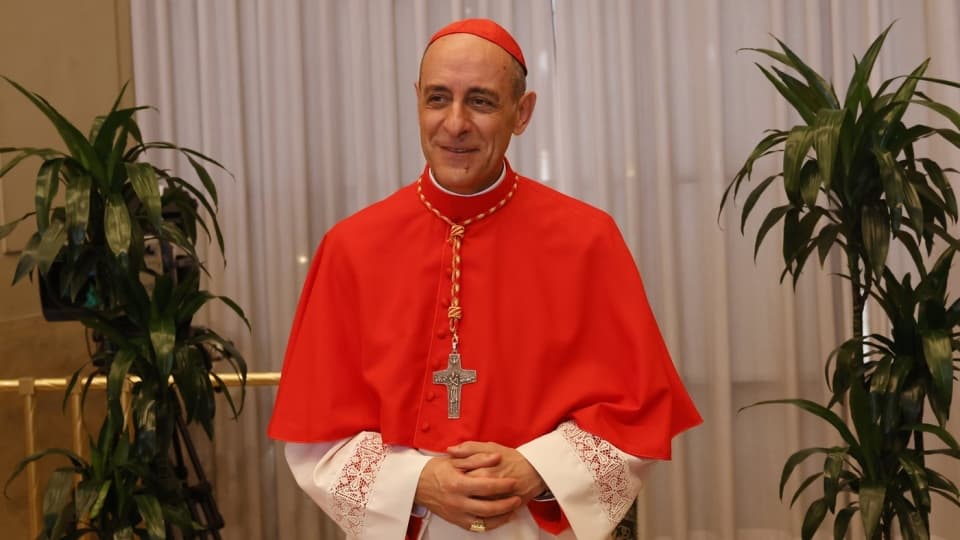ROME – Pope Francis’s new doctrine chief has said he believes a revised structure for his department is working well, and now includes a “democratic system” for handling whatever queries or complaints might arrive that prohibits him from making unilateral decisions.
New Cardinal Víctor Manuel Fernández, a close papal friend and ghostwriter who recently became prefect of the Vatican’s Dicastery for the Doctrine of the Faith (DDF), spoke to journalists Saturday after getting his red hat from Pope Francis alongside 20 other prelates from around the world.
RELATED: Pope tells new cardinals they are example of unity in diversity
Asked about his past use of social media and how he plans to engage any direct queries he receives, including those from “reactionaries” who take issue with his theology, Fernández acknowledged that in the past, “I was used to responding directly through Facebook, but now I have to take a little more care of how I move.”
“If queries arrive to me or questions…I cannot respond to them directly. I have to ask that they send them formally to the dicastery so that they follow their course,” he said, saying, “I am going to say that, it can call the attention of some people, but there is a very democratic system for dealing with those issues.”
When queries of any kind arrive – whether they be theological questions, doctrinal matters, or even dubia, or doubts, like those presented to the pope ahead of the upcoming Synod of Bishops on Synodality – “there is a series of steps; it passes by the team, it pass through the (weekly) meetings, then it passes by the team of member-bishops, and after it goes to the pope,” Fernández said.
“Then the pope can sometimes ask us to study it better. So, it’s not that a prefect can just make his own decisions,” he said.
Fernández, who recently met with both the disciplinary and doctrinal sections of the DDF, said he believes the department’s new structure, established as part of Francis’s recent reform of the Roman Curia, is working well, and allows more time to deal with matters that come up.
Last year Pope Francis issued a new law titled Fidem servare, or “To preserve the faith,” establishing independent doctrinal and disciplinary sections within the DDF.
The doctrinal section deals with matters related to the “promotion and protection” of faith and morals, including marriage annulment requests, and is also responsible for studying how to better the Church’s efforts in evangelization in light of scientific progress and societal change.
This section is also tasked with reviewing documents to be published by other Vatican departments that deal with “faith and customs,” with an emphasis on dialoging with authors of documents when the text appears to be problematic in some way to find “suitable remedies.”
According to the new law, the disciplinary section will deal with “grave” delicts, or crimes, including the sexual abuse of minors.
When Fernández’s appointment as DDF was announced this summer, it was accompanied by a personal letter from Pope Francis telling Fernández that his main task was to safeguard Church teaching, but without treating anyone as “enemies who point out and condemn.”
There were times in the past “where, more than promoting theological knowledge, possible doctrinal errors were persecuted. What I expect of you is undoubtedly something very different,” the pope said in the letter, and charged the DDF with ensuring that Vatican documents not only reflect perennial Church doctrine but also “accept the recent Magisterium.”
In his comments to journalists Saturday, Fernández said that in the doctrinal section, the pope’s reorganization “was extremely useful, because we have met at least twice a week.”
“Before, the meetings were almost exclusively on the topic of abuse and other topics were practically relegated [to the margins] … there was no time” to address them, he said. “Now, when the doctrinal section meets twice a week, we can advance at a good pace in the deepening of many issues, and when we need to respond to someone, we can do it with a bit more study and discussion.”
Fernández said the DDF is also drafting several documents, including a response to a bishop from the Democratic Republic of the Congo “about a spiritual experience that happened there,” which he said, without offering details, “helps us to clarify how to act in the future regarding these topics.”
Fernández also responded to impressions that the upcoming Synod of Bishops on Synodality – set to last from Oct. 4-29, and which is the first of a two-part, Rome-based discussion organizers have said is aimed at making the Church more welcoming and inclusive – is a secretive, closed-door process.
In his response, Fernández said “there’s not” a closed door, and that the goal of the synod is not to arrive at a specific conclusion “on any topic.”
It’s not that there is “a central topic, and we all get together to study that, because that is not the task of this synod,” he said, saying the process is more “methodological.”
Follow Elise Ann Allen on X: @eliseannallen













